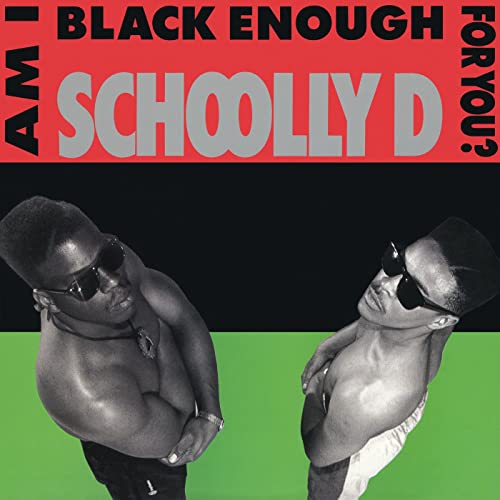These days if you’re familiar with rap legend Schoolly D it’s probably from the intros and outros he recorded for Aqua Teen Hunger Force, along with small cameos he made in episodes now and then. Back in the 1980’s though his “P.S.K.” record was considered a progenitor of the gangster rap genre — so much so that even Ice-T credits him as an influence and inspiration for his seminal “6 in the Mornin'” track. Nearly two decades ago I took a look at a “Best of Schoolly D” compilation I bought while in D’s home town of Philadelphia, and frankly that was almost the only way to find his work. Despite his music being prominently featured in Abel Ferrara films his albums were long out of print, and there weren’t any streaming services like YouTube Music and Spotify to give us access to discontinued records.
Thankfully things have changed since 2003. You can now buy albums like 1989’s “Am I Black Enough for You?” physically OR digitally, and you can stream them on multiple platforms to your heart’s content. There’s no doubt that the higher profile he gained on [adult swim] led to a resurgence in interest in his work, but even without the animated adventures of a fast food meal, nostalgia for Jesse Bonds Weaver Jr. would have eventually caused multiple services to share his music. The competition between them for your monthly subscription fee would be incentive alone — whoever can offer the most choices can win the content wars. Even an obscure album from a seminal rapper can have 100,000 to a million people who want to hear it again, and those numbers add up when aggregated together.
“Am I Black Enough for You?” is not an obscure album, but it is certainly a STRANGE album. Keeping in mind that Schoolly D’s rise to fame came from illustrating the more violent and dangerous aspects of life for the economically disenfranchised, I don’t think people were ready for D’s sudden change of philosophy. The red, black and green colors of the album’s art should have been the first clue something was up, but songs like “The Education of a Black Man” and “Don’t Call Me Nigger” make it abundantly clear he’s now on the conscious tip. This is the 1980’s equivalent of suddenly becoming WOKE. Schoolly D was still a gangster, but now he was trying to be more like KRS-One and less like his protege Ice-T.
There’s absolutely nothing wrong with Schoolly D wanting to uplift black people and speak on societal issues. After all N.W.A may have been considered gangster rap but “Fuck Tha Police” is just as relevant today as it was back in the 80’s. Police brutality and racial discrimination haven’t suddenly vanished in the last four decades. The problem is that Schoolly D’s calling card is BEING HARD. He was never the best rapper on the scene — not in Philly, not on the East coast, not in the whole United States. His trademark was short verses about how rough, tough and flashy he was. His difficulty fitting into an Afrocentric mold results in DJ Code Money songs like “Get Off Your Ass and Get Involved” that HE DOESN’T EVEN RAP ON.
This is not an isolated incident. He doesn’t appear on “Black Education,” “Black Attack” or “Black.” I hate to say it but the vibe you get from this is exactly what the movie CB4 was parodying on the song “Cause I’m Black Y’All!” It doesn’t come across as sincere concern for the welfare of the brothers and sisters — it comes across as a crass attempt to cash in on a suddenly popular sub-genre of hip-hop.
Eventually Schoolly D can’t help but reveal himself as who he truly is on songs like “Pussy Ain’t Nothin’.” I sincerely don’t mean disrespect to D when I say this but he’s not known for profound political views or “edutainment” in his verses. This is exactly what you’d WANT to hear from Schoolly D if you were already a fan of his work. It’s even set to the exact same Jimi Hendrix “Voodoo Child” sample 2 Live Crew used for “My Seven Bizzos.” It wouldn’t be hard to see the connection between the two even without it.
D even does a sequel to another of his earliest hits released around the same time as “P.S.K.” known as “Gucci Time.” What’s the sequel called? “Gucci Again.” I know that smacks of a lack of creativity, but so does copying what was trending in rap at the time, so at least this is Schoolly cloning himself and not somebody else.
History records that “Am I Black Enough for You?” failed to chart, but it didn’t stop him from releasing a similarly themed “How a Black Man Feels” two years later. That album benefits by comparison simply by being shorter and more focused. Stretched out over an hour, this Schoolly D record is bloated, and even the songs he raps on are padded out with intros and extended instrumentals. Out of affection for a rap pioneer I still enjoy what Schoolly D has to offer here, but for those unfamiliar with his catalogue this is NOT the first place to start. This is an album best enjoyed a la carte where you pick a few songs that you like and skip over all of the rest.

